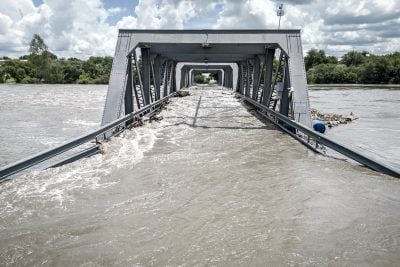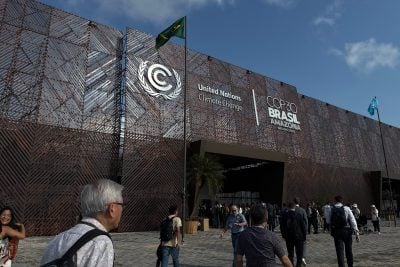The excess crude account, which has been set up to minimise the impact of oil price fluctuations on the national budget, has now rebounded to $8.4bn but this is still down from a peak of $20bn in 2007.
Trans-Sahara Gas Pipeline project progress has been slow, most recently because of delays to the passage of the PIB . Estimated construction costs have risen from $7bn in 2002 to $10bn now
Within the Nigerian economy, the problems of the hydrocarbon sector are almost as old as independent Nigeria itself. With vast reserves of both oil and gas, the industry has the potential to make an important contribution to economic development by helping to fund investment in other areas of the economy. In practice, over the past 40 years, the oil industry has become the Nigerian economy, as government after government has relied on oil exports to pay for everything else. As the rest of this report demonstrates, progress on developing non-oil sectors is being made at long last but the oil industry itself has the potential to make a much more positive contribution.
Nigeria had been the world’s eighth-biggest oil producer for many years but it has now fallen to 12th position because of the poor security situation in the Niger Delta and the lack of investment in new upstream exploration. All onshore and offshore territory is divided up into blocks of thousands of square kilometres, which are allocated to companies on the basis of their development plans and the size of the fee, or signature bonus, that they offer to pay the government for the licence to operate the block. The licence allows the successful bidder to firstly explore for hydrocarbons – crude oil, natural gas and other associated natural resources – on each block, and then to produce and market any output.
Historically, almost all production comes from onshore and shallow-water fields in the Delta but improvements in deepwater production technology have made the development of the country’s deepwater fields commercially viable.
The most important advance has been the introduction of floating production storage and offloading (FPSO) vessels, which allow oil to be produced and stored in a single vessel for offloading to oil tankers, without the need for fixed oil platforms. The isolated location of deepwater fields allows oil companies to bypass much of the Delta unrest. The biggest producer in the country is Shell Petroleum Development Cooperation (SPDC), which is owned by the Nigerian National Petroleum Corporation (NNPC) (55%), Shell (30%), Total (10%) and Agip (5%).
The federal government benefits from oil and gas production via a stake in each joint venture through the state-owned NNPC, plus signature bonuses, royalties and taxes. Abuja, the NNPC and the oil companies do not publish full details of their revenuesharing formula, although Jonathan has said that this will change if the PIB is implemented as envisaged. However, some sources suggest that at an oil price of $50 a barrel, the government receives $44.13 (88%) and the oil company $1.87 (3.7%), with $4 (8.3%) to cover technical costs.
Depressed production and militant attacks on the oil industry therefore have a huge impact on government revenues. The oil producing states’ share of this income has varied over the past 40 years but currently stands at 13% of government income. The federal government has set up two financial mechanisms to improve its Wealth Fund, which is designed to ensure that future generations of Nigerians benefit from oil income, has barely got off the ground.
The excess crude account, which has been set up to minimise the impact of oil price fluctuations on the national budget, has now rebounded to $8.4bn but this is still down from a peak of $20bn in 2007.
Industry reforms
National oil production capacity stands at 3m barrels a day (b/d) but actual output fell below two thirds of this level because of Delta violence, including sabotage on oil industry infrastructure and illegal oil bunkering operations.
However, the 2009 militant amnesty has undoubtedly has a positive impact. Explaining the recovery, the National Bureau of Statistics stated: “The activities of vandals and oil theft decreased as a result of intensified surveillance instituted by government in the oil-producing areas and re-entry into previously abandoned fields by some oil majors and renewed production.” Production returned to 2.5m b/d by the end of last year and could rise substantially higher if future terms of investment are sorted out. National oil reserves now stand at 40bn barrels plus 185 trillion cubic feet of natural gas.
The centrepiece of the government’s hydrocarbon reforms is the Petroleum Industry Bill (PIB), which seeks to break up the stateowned NNPC, restructure the investment regime and generally create a more competitive industry.
However, it is taking far longer to pass the bill than originally hoped, partly because there are huge vested interests in maintaining the status quo.
President Goodluck Jonathan says that delays to the PIB have badly affected investment in existing and planned oil field projects. He said: “Concluding the PIB is critical, and without concluding it, investment will drop. It’s already dropping. No new investors are coming in.
“The PIB has moved into the parliament. I have no controlling say on the parliament. We have done our own part. I would be misleading you if I said in a month, three months, six months the PIB will get through.” There have been no licensing rounds for hydrocarbon acreage for several years.
Gas and power
Until the development of the NLNG (Nigeria Liquefied Natural Gas) plant, both the Nigerian government and the oil companies that dominate the sector had almost entirely ignored the country’s gas wealth amid the obsession with crude oil.
Gas that exists on fields without crude oil – known as non-associated gas – was largely ignored, while far too much of the associated gas – found alongside crude oil – was flared in order to allow access to the oil. Gas is now consumed by the Nigeria LNG plant on Bonny Island, which is owned by a consortium led by Shell. The gas is cooled to process it into a liquid that can be transported around the world by tanker. At least half a dozen other LNG schemes have reached various stages of technical development but again uncertainty over the PIB has held up development.
More gas could be exported via the Trans-Sahara Gas Pipeline project, which was originally proposed in 2002. The scheme involves the construction of a pipeline through Nigeria and Niger into Algeria, to allow 30bn cubic feet a year of Nigerian natural gas to be exported directly to European customers via pipelines under the Mediterranean Sea. Progress has been slow since then, most recently because of delays to the passage of the PIB. Estimated construction costs have risen from $7bn in 2002 to $10bn now, although the global economic crisis has depressed steel and engineering costs and prevented an even greater rise in the price tag. Additional investment in gas gathering infrastructure will also be required.
NNPC spokesperson Tuminu Green said: “The project is ongoing in spite of the numerous challenges threatening to stall it. The memorandum of understanding between Nigeria and Algeria has been signed; a feasibility study for the project has been concluded and the process of laying pipes from Calabar through Kano is about to begin.” In addition to NNPC and Algerian state oil and company Sonatrach, foreign investment in the scheme will be needed. Russian gas giant Gazprom has expressed its interest in the venture but no concrete agreement has been reached. The most obvious other outlet for Nigerian gas is in domestic power generation. Gas prices within the country have been regulated at a very low level that has made it uneconomic for oil companies to market their output locally.
Jonathan has pledged to introduce a commercial market that would see a string of gasfired power plants developed, particularly in the south of the country. The government has set a target of developing 10 GW of additional generating capacity by 2020, but a succession of similar promises over the past 12 years have not been kept.
There is now more confidence that the government can fulfil its promise to unbundle and privatise most of the Power Holding Company of Nigeria (PHCN) over the next two years. Yet this too is dependent on the passage of the PIB and huge increases in the regulated cost of natural gas.
However, even if both elements are achieved, most new power plants are likely to be developed as independent power producers (IPPs) by foreign investors rather than the PHCN. Even then, national transmission and distribution infrastructure must be massively upgraded. The reform process has barely even begun.
Want to continue reading? Subscribe today.
You've read all your free articles for this month! Subscribe now to enjoy full access to our content.
Digital Monthly
£8.00 / month
Receive full unlimited access to our articles, opinions, podcasts and more.
Digital Yearly
£70.00 / year
Our best value offer - save £26 and gain access to all of our digital content for an entire year!
 Sign in with Google
Sign in with Google 


